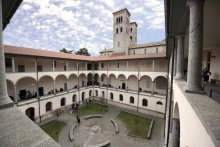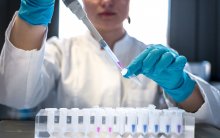Ph.D Course
Restricted access
3 years
Varese
Italian
DIPARTIMENTO DI MEDICINA E CHIRURGIA
Course description
The XL cycle of the Ph.D course in Experimental and Translational Medicine aims at applying an interdisciplinary approach to human health to allow a valuable transfer of the most recent developments in basic sciences to the clinical practice. The main goal of the course is to overcome the compartmentalization often encountered between basic and medical sciences as a consequence of the obviously different experimental approaches used and to enable the Ph.D. student to acquire multiple technical skills, learn a scientific interdisciplinary approach (including cellular biology, genetics, immunology, microbiology, physiology and neurosciences) and successfully export these knowledges to the prevention, diagnosis, and treatment of a panorama of clinical pathologies. Indeed, although Translational Medicine is experimental by nature, it must be developed keeping in mind its potential impact on the improvement of human health.
The Ph.D. student will be asked to carry on an experimental study using specific and innovative technological tools, to adequately interpret the results of the study and to learn several aspects of the clinical research approaches in order to develop his/her own skill in evaluating the applicability of new technologies to clinical research.
More specifically, the targets of the XXXIX cycle of the Ph.D course are to provide the student with the know-how:
- to fully develop the research project chosen among those proposed for the XXXVIII cycle and to master the experimental procedures needed to solve potential experimental difficulties
- to adequately interpret and discuss the obtained results, to write scientific reports and to present the data to the scientific community at national and international meetings
- to be able to experience a period (6-18 months) of research in a highly qualified foreign research institution
- to prepare the final thesis and to present and discuss it with a Commission of experts at national and international levels.
The Ph.D. in Experimental and Translational Medicine will be qualified for the Academic and Health Care community, for private and public research Institutions and for biotechnological industries
What you need to know
The candidates must posseses a University degree in Medicine, Biological Sciences, Biotecnologies, Pharmacy, Chemistry and Pharamaceutical Technicques
Enrollment
You can enroll after a public competition for qualifications and examinations.
Number of Scholarships: 8
Positions without scholarship: 2
Please see:
Class attendance
Formal teaching activities (mandatory and optional) associated with the Doctoral Program are defined annually by the Board of Lecturers.
Doctoral students are required to carry out their research work full-time at the Laboratory of the faculty member coordinating the chosen research project.
Sperimentazione animale e modelli alternativi:aspetti legislativi,sperimentali ebioetici (primo anno)
Modulo A1) Organoidi e culture cellulari3D, rilevanza nell'ambito delconcetto di "replacement"2) Organoidi, culture cellulari 3De applicazione in ambito di ricercapreclinica3) Organoidi e rispetto di aspetti dibioetica4) Sviluppo di metodiche in vitro eloro validazione in ambitoregolatorioModulo B1) La attuale regolamentazioneitaliana in ambito disperimentazione animale nellaricerca biomedica2) Modelli preclinici di tipoanimale e alternative di utilizzo dimodelli sperimentali “in vitro”3) Modelli animali su specie diinvertebrati4) Aspetti bioetici dellasperimentazione animale nellaricerca biomedica di base eapplicativa
The NGStechnique: theory, applications and future perspectives (secondo anno)
This minicouse will be organizedin four lessons on the followingarguments: a) the NGS techniqueand the relative possibleapplications; b) third and fouthgeneration sequencing; c)functional aspects of geneexpression and regulation; d)NGD Data analysis workflow andfunctional enrichment.
Introduction to Systems Biiology (primo e secondo anno)
The course is a primer to workwith large datasets (big data orwide data) that suffer fromdimensionality and sparsity. Afterdescribing common strategies forfeature selection and extraction,students will learn how to obtainfunctional information fromextracted features. Moreover,foundations of graph theory andnetwork science will be describedand discussed.Lesson 1 (4 h): Introduction toSystems biology. Emergentproperties and nonlinear complex systems. Dimensionality reductionin datasets (NGS, proteomics).Univariate filters. Multivariateanalysis (PCA, PLS, PLS-DA).Cross-validation. The receiveroperating characteristic. Recursivefeature elimination. Practicalactivities.Lesson 2 (4 h):Over-representation analysis. TheFisher exact test. Correction formultiple testing (Bonferroni vs.Benjamini-Hochberg).Gene/protein databases. Ontologyand pathway databases. Otherdatabases for functionalenrichment. Gene-set enrichmentanalysis. Practical activities.Lesson 3 (4 h): Principles of graphtheory. Network statistics.Topological analysis. Randomnetworks vs. real networks.Clustering strategies. TheCytoscape environment. Practicalactivities.
Techniques for Neuroscience
1. “Imaging techniques”Dott Cesare Covino, ALEMBIC(Advanced Light and ElectronMicroscopy Bioimaging Center),San Raffaele.2. “Techniques to study neuronalplasticity”Prof Tommaso Pizzorusso, ScuolaNormale Superiore of Pisa.3. Stereotaxic proceduresProf.ssa Angelisa Frasca,Università di Milano4. “Genome editing for diseases ofthe CNS”Prof.ssa Alessandra Recchia,University of Modena5. “Generation and study of iPSCand organoids as models forgenetic diseases of the nervoussystem”Prof.ssa Anna Corradi, Universityof Genova.
Applicazioni in ambito oncologico della tecnologia NGS a scopo diagnostico, prognostico e terapeutico: - il modello del carcinoma colorettale – il modello del carcinoma endometriale (terzo anno)
Il minicorso ha lo scopo didelineare l'impiego sempre piùdiffuso della tecnologia NGS nellapratica clinica oncologica e dimostrare come le classificazionitumorali richiedano l'integrazionedi conoscenze approfondite deimeccanismi tumorigenici per ilriconoscimento di entitàbiologiche distinte e per la correttaimpostazione degli approcciterapeutici.
Cancer stem cells: understanding tumour hierarchy and heterogeneity for cancer treatment. – Lesson 1: From Stem cells to Cancer Stem Cells. – Lesson 2: Cancer Stem Cell’s Niche. The relation with the microenvironment. – Lesson 3: Targeting Cancer Stem Cells. Innovative approaches for targeting CSCs.
Cancer stem cells (CSCs) areself-renewing cells that areidentifiable in most liquid andsolid cancers and contribute totumor onset, expansion, resistance,recurrence and metastasisfollowing therapeuticalapproaches. CSCs are identified by theexpression of cell surface markers,which depends on the type oftumor. The transition betweenCSCs with cancer cells occurs intumors and is under the control ofreciprocal signals between CSCsand the tumor microenvironment(TME), including the CSC niche.Different degrees of evidenceindicate that cancer stem cells area relevant cause of failure ofconventional chemo/radiotherapy,due to their resistance to suchtherapeutic approaches. Therefore,targeted therapy to eliminate CSCsis essential.
Experimental imaging in translational research (terzo anno)
The seminary is focused on theusefulness of experimentalimaging for preclinical andclinical researchers in traslationalmedicine.The use of advanced andinnovative imaging technologiesallows to observe, monitor,analyze with high resolution everychange in small animals (mice,rats) ?induced by drugs,molecules, anti-bodies beforehistology.Experimental imaging based onUltrasound, Color Doppler,Photoacoustic, CEUS, MagneticResonance, ComputedTomography, micro-PET, OpticalImaging can accurately providequalitative and quantitativeinformation in differentcardiovascular, oncological andinflammatory diseases.Number of experiments andsacrified animals can besignificanly reduced, whileresearch level significantly raisedusing experimental imaging.
Elementi di elettrofisiologia cardiaca (terzo anno)
Attività elettrica delle cellulemiocardiche, genesi del potenzialed'azione e genesidell'elettrocardiogramma disuperficie; principi diaritmogenesi cardiaca;registrazione dei potenzialielettrici endocavitari; valutazioneelettrofisiologica invasiva; aritmiecardiache ed impatto sullafunzione cardiaca?
“InnovationCamp” for Insubria PhD students - A deepdive intoinnovation andexecution (primo e secondo anno)
Objective:According to EU Council,entrepreneurship is one of theeight Key Competences forLifelong learning. InnovationCamp for PhD Students is a coursededicated to the dissemination ofentrepreneurship and innovationconcepts among PhD students andto the development of the relatedhard and soft skills. It begins fromthe milestones of the lean startupapproach up to the development of an innovative idea. At the end ofthe course an open badge will beissued to all participants whoattended both the open day and atleast 75% of the remainingproposed activities.COURSE TOPICSOpen day: Research potential,entrepreneurship, and technologytransfer (4 h)° Research social and economicimpact° Technology transfer toolsprovided from the AtheneumIntroduction to startup world (4 h)° The start-up world: fundamentaltools° Market analysisLegal aspects (4 h)° IP protection strategies° Legal issues of startupsThe Lean Startup with hands-on (4h)° The Lean Startup approach° Value Proposition and BusinessModel CanvasFunding and supporting the idea(4 h)° The capital raising process° EU opportunities for startups° Focus on alternative finance andon the role of business angelsCommunication of the idea (4 h)° Pitch structure° Soft skills for pitchingTeam working & mentoringactivities (4 h)° The importance of the team° How to work efficiently in ateam° Mentoring activitiesPitch refinement session (4 h)Final presentation of businessideas (4 h).
Altre attività didattiche
Valorizzazione e disseminazione dei risultati, della proprietà intellettuale e dell’accesso aperto ai dati e ai prodotti della ricerca
Transversal skills -Objective:Despite the undisputable value of specialized skills, the transversal ones represent a main key to professional success, according tosome scientific studies. Transversal or soft skills pertain to cognitive, creative, managerial, relational and communication areas. Not only they represent the “most wanted” competences indicated by the corporate sector, but they are also essential life skills.Acquiring these skills provides students with the basic knowledge, abilities and qualities required to translate competences intosuitable behavior for organizational purposes and for their professional evolution and success.COURSE TOPICSThe course will provide students transversal skills. The course is organized in three modules, provided in different years:Module A: Information Literacy; Digital Literacy, Doctoral thesis and copyright; Open access; Collecting and processinginformationModule B: Presentation skills; Problem solving; Results dissertationModule C: Economy; Project Management; Patents & trade marks; European research programs.
Seminari
- Mathematical methods for the natural sciencesObiettivi: Fornire elementi di base per l'analisi matematica e numerica delle proprietà di sistemi d'interesse per le scienzechimiche, fisiche, e naturali.Programma: Equazioni differenziali ordinarie, con applicazione alla cinetica chimica ed al trasferimento di energia; equazioni allederivate parziali, con applicazione alla teoria del trasporto di materia; metodi di approssimazione funzionale, con applicazioni amodelli di sistemi fisici classici e quantistici; metodi di integrazione numerica per integrali definiti mono-dimensionali, equazionidifferenziali ordinarie e loro sistemi; integrazione Monte Carlo con applicazione alla diffusione ed ai modelli di molecolepolimeriche; soluzione delle equazioni del moto e loro applicazione a sistemi di rilevanza chimica.
- Giornata Annuale Giovanna Tosi - Recenti acquisizioni in Oncologia e malattie infettive.La giornata di studio e confronto tra esperti di livello nazionale e internazionale affronta tematiche relative alle cause, incidenza,diagnosi e cura delle patologie neoplastiche con particolare riferimento a quei tumori indotti da agenti patogeni nonchè agli aspettidelle difese immunologiche che l'organismo mette in atto contro i tumori.
- Giornata annuale sul cervello nell'ambito della "Brain Week".Saranno presentati dati recenti sul legame tra infezioni/infiammazioni e disturbi del neurosviluppo, disturbi neuropsichiatrici eneurologici. Si parlerà del complesso insieme di fattori ambientali, genetici, epigenetici, immunologici, microbiologici, biochimici,educativi e sociali che possono influenzare l'insorgenza e l'evoluzione dei disordini dello spettro autistico e saranno discussepossibili strategie per affrontarli.
- Asma bronchiale e broncopneumopatia cronica ostruttiva.Saranno discusse tematiche relative: a) alle fasi dello sviluppo e al trattamento clinico di broncopatia cronica ostruttiva (BPCO) edi asma, b) allo studio dell'infiammazione bronchiale mediante metodica non invasive (espettorato indotto) in pazienti con BPCO;c) all'identificazione del fenotipo eosinofilico maggiormente sensibile alla terapia corticosteroidea e alla diversa gestione deipazienti asmatici, che include anche la valutazione della cellularità bronchiale mediante test dell'espettorato indotto.
- Bioinformatics - Prof. Gianluca MollaObjective:Provide student with practical knowledge of the main bioinformatic processes used in protein investigation. All lessons will beheld at the computer, in an informatics class. Most of procedures shown will be performed by the students themselves under thesupervision of the teacher. Results will be discussed in a critical manner.COURSE TOPICSThe course will cover the main topics of the bioinformatics approach to the study of the structure/properties of the proteins. Indetails:1. The format of structural data and structural databases (PDB files, RCSB, PDBeChem, ...) and how to search and retrievestructural information2. Basis of visualization of 3D structures and software for macromolecule visualization (PyMol, VMD, ...)3. Prediction of structural properties of proteins (secondary structure, transmembrane regions, signal peptides, ...)8. Discover the evolutionary history of a protein: build a phylogenetic tree, detect the most conserved positions and predict thesequence of ancestral proteins4. Construction of models of the 3D structure of a protein (ab initio modelling, homology modelling)5. Build models of variants in vitro - foldX - ProSAR6. Prediction of binding of small ligands (e.g., drugs) to proteins by Automated Molecular Docking7. Prediction of quaternary structure haddock, Z-DOCK8. Simulation of protein flexibility in solution: The Molecular Dynamics approach
- Biostatistics - Prof. Giorgio BinelliObjective:All fields of modern biology cannot be successfully approached without a knowledge of their statistical and biometrical aspects. Itis thus necessary to provide the student with interlaced biological and statistical knowledge. The goal of this course is to make thestudents familiar with the statistical theory and terminology, so to understand the power and pitfalls of statistical analysis, withspecial emphasis on the planning of the experiments and the analysis of experimental data in the field of Life Sciences.COURSE TOPICSBasics of statistical analysis- Why use Statistics. Populations and samples. Basics of probability. Random variables.- Frequency distributions; what is a statistical test: power and protection of a test, Type I and Type II errors.The most common statistical tests- Quantitative and qualitative variables - which test?- Some uses of the z variable.- The ?2 test. Goodness-of-fit test and comparisons between proportions.- The General Linear Model (GLM)- Some uses of Student's tOther statistical tests- The model of Analysis of Variance (ANOVA).- One-Way ANOVA: the completely randomised and the randomised block designs. Two-way ANOVA.- Linear regression and correlation models, parameters estimate in linear, multiple and curvilinear regression.
Perfezionamento linguistico
Corso di Lingua inglese di livello B2.Il corso mira al miglioramento e consolidamento delle 4 abilità fondamentali della lingua inglese (listening, reading, speaking,writing) e fornisce strategie utili ad affrontare l'esame di Certificazione (B2 FIRST - Cambridge Assessment English, Livello B2del Quadro Comune Europeo di Riferimento per la Conoscenza delle Lingue, QCERhttps://www.britishcouncil.it/esami/perche-conseguire-certificazioni-lin...).Al termine del corso gli studenti dovranno essere in grado di:- Comprendere le idee principali di testi complessi- Interagire con un grado di spontaneità tale da rendere possibile un'interazione con un madrelingua inglese.- Produrre testi chiari e dettagliati su vari argomenti e spiegare il proprio punto di vista su un argomento di attualità.Le lezioni vengono erogate in lingua inglese, con analisi delle nuove strutture grammaticali (morfosintattiche) e lessicali, seguiteda esercizi per facilitare l'apprendimento e l'acquisizione.Gli studenti sostengono un test finale che misura il livello di competenza raggiunto e che tiene conto, come metro di riferimento,della scala di valutazione usata per il livello B2 dell'esame Cambridge English ESOL.Le lezioni di lingua inglese sono integrate da un percorso di apprendimento misto della lingua inglese tramite la piattaformasoftware multimediale MacMillan English Campus (MEC), che prevede esercizi di listening e reading comprehension, pronuncia egrammatica ritagliati sul livello dei singoli dottorandi e utili all'acquisizione graduale di competenze necessarie a raggiungere illivello B2 richiesto.Gli studenti sono seguiti e monitorati da un tutor esperto in lingua inglese e referente pe la piattaforma. Gli apprendenti dovrannodimostrare di avere svolto tutto il percorso di esercizi assegnato almeno con un 70% di successo (che corrisponde a 7/10 oppure a 21/30).
For information
c/o Dipartimento di Medicina e Chirurgia - DMC
Università degli Studi dell'Insubria
Via Guicciardini, 9 - 21100 Varese
Coordinatore: Prof. Mauro Fasano
E-mail: mauro.fasano@uninsubria.it





